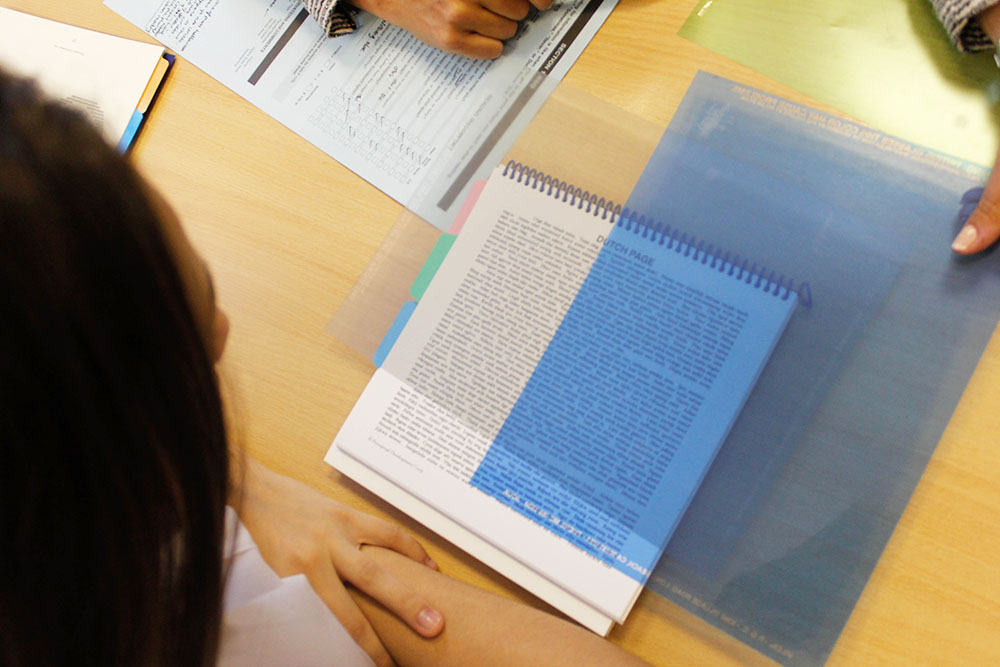

Indicators of scotopic sensitivity syndrome can be similar to those of Dyslexia, which can lead to a misdiagnosis. Scotopic sensitivity syndrome can be helped by using coloured overlays during reading, colour tinted glasses or changing the background colour on electronic devices.
Visual stress (sometimes called 'Meares-Irlen syndrome' or 'scotopic sensitivity syndrome') is the experience of unpleasant visual symptoms when reading, especially for prolonged periods. Symptoms include illusions of shape, movement and colour in the text, distortions of the print, loss of print clarity, and general visual irritation. Visual stress can also cause sore eyes, headaches, frequent loss of place when reading, and impaired comprehension.
Visual stress is caused by the striped effect of black writing on white paper which causes over stimulation and excitation of the visual cortex .
If a child or young person is complaining of difficulty reading, having headaches when they read or suggest printed text seems to move, then they could benefit from a scotopic sensitivity syndrome assessment.
Scotopic sensitivity syndrome is a self-reported assessment through a structured conversation with the child or young person whilst carrying out a number of reading activities using different coloured overlays. The level of discomfort and difficulty experienced during reading activities is recorded throughout the assessment.

A girl completing an assessment for scotopic sensitivity syndrome, using coloured overlays
If a child or young person has scotopic sensitivity syndrome then our psychologists will discuss various options for coloured overlays or tinted lenses in the appropriate colour to help. Through wearing tinted lenses or using an overlay the individual should notice a positive difference in their reading activities.
We value ourselves on providing a complete service and if you would like further input following an assessment then we would be happy to support a literacy intervention if this is requested. Usually, with scotopic sensitivity syndrome, the use of tinted lenses or coloured overlays negates the need for intensive intervention following an assessment.
Coloured overlays and coloured glasses can increase the speed of reading, although with conventional text the improvement may only be apparent after 10 minutes of reading, when the child would begin to tire were an overlay not used. If the text is closely spaced, the benefit is more immediate.
Scotopic sensitivity syndrome causes difficulty with reading printed text and can be helped through the use of tinted lenses or coloured overlays. To book a scotopic sensitivity syndrome assessment or to find out more please contact us now to talk to member of our team.








Once again thank you for all your help and for actually listening to me when others wouldn’t.

Jodie (Parent)
Thank you Julie once again for the excellent report, it captured the child’s needs entirely - SENDIASS, parents and me commented on how well written it was. Many thanks for your continued assistance.

SENCO
Sarah Ward was brilliant with us. Really happy with the help and support, would recommend.

Joanne (Parent)
I think the work you have been doing has been great to help break the stigma of mental health and as a fellow sufferer I know how important that is.

Mental health professional
Many thanks for Sarah W’s hard work with our students which has been very well received.

Deputy Head
Really enjoyed it and learnt lots that I can take back to school. Thank you for the quality experience.

Sarah Tindal
Thank you Julie once again for the excellent report, it captured the child’s needs entirely - SENDIASS, parents and me commented on how well written it was. Many thanks for your continued assistance.

SENCO

We provide bespoke solutions to suit all budgets and requirements for children and young people aged 0-25 in homes, education settings and the community. Our clinical, educational and child psychology services are cost effective.
To make a referral and arrange an initial discussion please complete our referral form.

Ready to get started? The next step is to speak to our team to find out more about the services we provide and how we can help. Call us on 0161 820 9229 or email office@hsrpsychology.co.uk